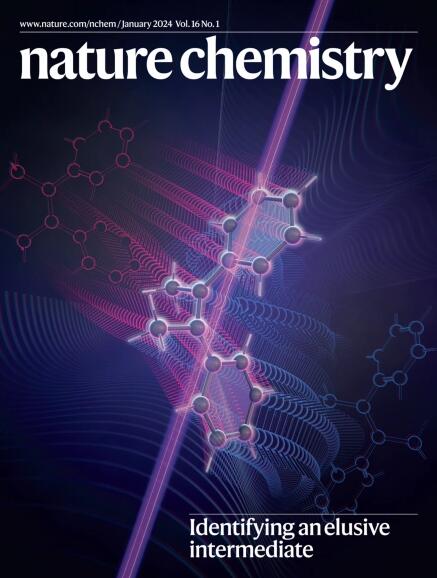在烯烃异构化中,开壳Ir(II)/Ir(IV)氧化还原对的性能优于Ir(I)/Ir(III)氧化还原对
IF 19.2
1区 化学
Q1 CHEMISTRY, MULTIDISCIPLINARY
引用次数: 0
摘要
基于第一排过渡金属的开壳体系及其在各种催化过程中的作用得到了很好的探讨。相比之下,贵重过渡金属的单核开壳配合物仍不发达。对于IrII配合物来说尤其如此,因为关于它们在催化中的应用的信息非常有限。在这里,我们发现了一个具有c6h3 -2,6-(OP(tBu)2)2 (POCOP)螯合配体的IrII金属自由基家族,有效地催化烯烃异构化,这是烷烃合成的关键步骤,其活性比IrI高20倍。计算研究表明,由于减少了氧化加成和还原消除步骤的障碍,IrII/IrIV氧化还原循环比传统的IrI/IrIII途径具有更快的动力学。因此,本研究提出了一种涉及IrII/IrIV对的氧化还原催化剂,突出了贵金属系统超越传统氧化还原循环的能力。这些发现强调了扩大催化设计原则的必要性,特别是对于铂族金属。本文章由计算机程序翻译,如有差异,请以英文原文为准。


An open-shell Ir(II)/Ir(IV) redox couple outperforms an Ir(I)/Ir(III) pair in olefin isomerization
Open-shell systems based on first-row transition metals and their involvement in various catalytic processes are well explored. By comparison, mononuclear open-shell complexes of precious transition metals remain underdeveloped. This is particularly true for IrII complexes, as there is very limited information available regarding their application in catalysis. Here we show that a family of IrII metalloradicals, featuring a C6H3-2,6-(OP(tBu)2)2 (POCOP) pincer ligand, effectively catalyses olefin isomerization—a key step in alkane metathesis—exhibiting up to 20 times higher activity than their IrI counterparts. Computational studies reveal that the IrII/IrIV redox cycling enables faster kinetics than the traditional IrI/IrIII pathway owing to reduced barriers for the oxidative addition and reductive elimination steps. Thus, this study presents a redox catalyst involving an IrII/IrIV pair, highlighting the capabilites of precious-metal systems that extend beyond traditional redox cycles. These findings emphasize the need for expanding catalytic design principles, especially for platinum-group metals. The chemistry of precious-metal-based open-shell mononuclear complexes remains underdeveloped. Now it has been shown that iridium metalloradicals enable Ir(II)/Ir(IV) redox cycles and catalyse olefin isomerization more efficiently than their more commonly used closed-shell analogues, which typically operate through Ir(I)/Ir(III) or Ir(III)/Ir(V) cycles.
求助全文
通过发布文献求助,成功后即可免费获取论文全文。
去求助
来源期刊

Nature chemistry
化学-化学综合
CiteScore
29.60
自引率
1.40%
发文量
226
审稿时长
1.7 months
期刊介绍:
Nature Chemistry is a monthly journal that publishes groundbreaking and significant research in all areas of chemistry. It covers traditional subjects such as analytical, inorganic, organic, and physical chemistry, as well as a wide range of other topics including catalysis, computational and theoretical chemistry, and environmental chemistry.
The journal also features interdisciplinary research at the interface of chemistry with biology, materials science, nanotechnology, and physics. Manuscripts detailing such multidisciplinary work are encouraged, as long as the central theme pertains to chemistry.
Aside from primary research, Nature Chemistry publishes review articles, news and views, research highlights from other journals, commentaries, book reviews, correspondence, and analysis of the broader chemical landscape. It also addresses crucial issues related to education, funding, policy, intellectual property, and the societal impact of chemistry.
Nature Chemistry is dedicated to ensuring the highest standards of original research through a fair and rigorous review process. It offers authors maximum visibility for their papers, access to a broad readership, exceptional copy editing and production standards, rapid publication, and independence from academic societies and other vested interests.
Overall, Nature Chemistry aims to be the authoritative voice of the global chemical community.
 求助内容:
求助内容: 应助结果提醒方式:
应助结果提醒方式:


